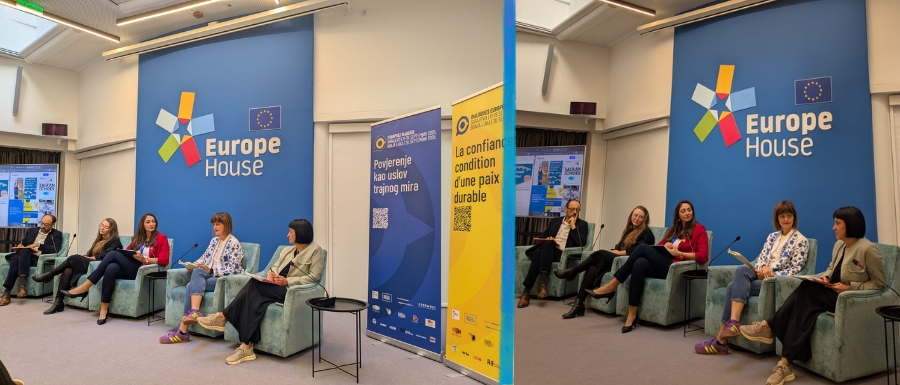From September 17 to 20, 2025, the European Dialogues in Bosnia and Herzegovina brought together prominent figures from civil society, youth activism, and research to explore the role of trust in promoting lasting peace and social cohesion. Among the many voices contributing to the dialogues, Maddalena Alberti, ALDA Governing Board member and director of the Ambasciata della Democrazia Locale in Zavidovici, provided a unique perspective on how trust can be rebuilt in post-conflict societies, both within the Balkans and beyond. She was joined by Dženana Dedić, delegate of LDA Mostar, who also participated in the panel discussions, adding valuable insights on the local context of trust-building in Mostar and the broader region.
The dialogues, held in Sarajevo and Banja Luka, delved into the aspirations of societies in the Balkans since the end of the war, examining the fundamental role of trust in fostering social cohesion, supporting peace processes, and strengthening democratic resilience.
Maddalena Alberti participated in the panel on September 18 and addressed a crucial question: How can we restore trust in our communities and institutions in Europe? Maddalena’s contribution highlighted the significant challenge of rebuilding trust in Bosnia and Herzegovina, a country that, three decades after the Dayton-Paris Accords, still grapples with the legacy of conflict and a sense of detachment between citizens and their political leaders.
In her intervention, Maddalena discussed the similar trends she observes in Zavidovici, where many citizens feel that decisions are made far away and are rarely explained.
“The trend is the same here as it is in Bosnia and in Italy… People don’t trust institutions because they feel excluded from the decision-making process.”
However, Maddalena emphasised that trust can be rebuilt through community-driven initiatives.
Drawing on her work with ALDA, she pointed out how local projects, especially those engaging youth, help bridge the gap between citizens and institutions.
“When people start out skeptical, but are involved in projects, they often end up supporting each other and creating strong bonds.”
Maddalena explained.
A central theme in Maddalena’s speech was the importance of participatory governance in restoring trust. She pointed to ALDA’s initiatives, such as the Regional Youth Compact for Europe and BOOST (Balkans for Optimising Opportunities, Sustainability, and Transformation of Civil Society), which empower citizens, particularly youth, to play a meaningful role in shaping policies that affect their futures. These initiatives go beyond symbolic consultations, as they provide real opportunities for citizens to influence governance and feel that their voices are heard.
Maddalena’s approach also underlines the importance of transparency and accountability in rebuilding trust. She recalled how the introduction of public hearings in municipalities in Kosovo increased citizens’ confidence in local governance, illustrating how transparency can restore credibility.
“When leaders are accountable and consistent, trust grows.”
she said.
As ALDA works on the ground in Bosnia and Herzegovina, Albania, and other Western Balkan countries, Maddalena shared how local democracy plays a fundamental role in EU integration.
“Trust is built when democracy is experienced daily at the local level. Europe is not a distant promise; it becomes real through citizens’ engagement in their communities.”
she emphasised. ALDA’s mission to act as a bridge between local authorities and EU institutions is critical in ensuring that democratic practices are not just implemented but lived.
Maddalena concluded with a powerful call to action: “To restore trust, Europe must be experienced locally.” She highlighted the importance of youth engagement, cross-border cooperation, and the inclusion of local actors in the EU accession process. Her belief in democratic ownership as the key to successful integration and long-lasting trust is a reminder of the foundational role local governance plays in building a united Europe.
Looking ahead, Maddalena’s reflections pointed to the need for sustained efforts in promoting trust between individuals, communities, and institutions. She said that trust must be renewed daily, with perseverance and coherence, reminding us that trust-building requires both political will and human connection.
In the end, the message is clear: the future of Europe depends on creating societies where trust is rebuilt from the ground up, through genuine citizen participation and inclusive governance. As the Western Balkans work towards EU integration, the region’s success will not just be measured by political agreements, but by the extent to which citizens feel they have a meaningful role in shaping their future. Trust in Europe will grow when citizens experience the European idea locally, in their neighborhoods and communities, every single day.
